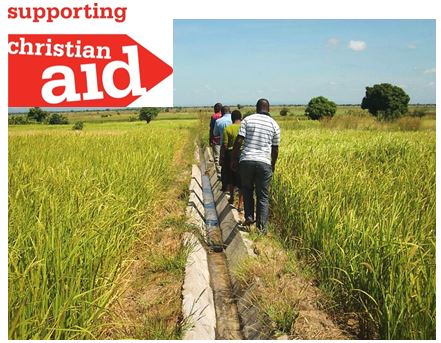
by Fern Shaw | Mar 30, 2017 | Charity, Christian Aid
The donation figures from AquAid to Christian Aid over the last two years were very encouraging, with £107,093 being donated in 2015 and £111,132 donated in 2016, meaning an additional £4,039 donated last year.

Christian Aid’s focus for the next three years will be on two specific projects in Malawi and Ethiopia. With AquAid’s trip to Ethiopia last year already documented, in this issue we highlight Christian Aid’s projects in Malawi.
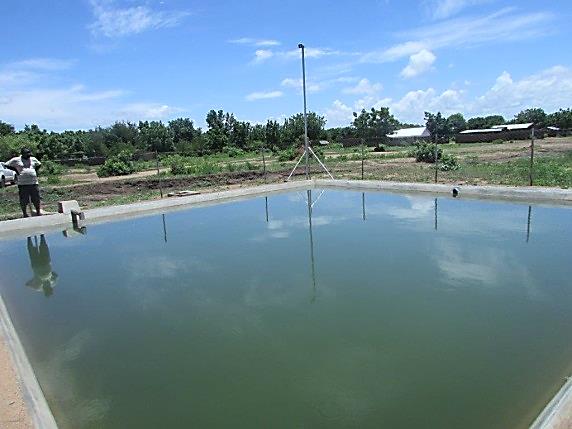 Malawi is among the world’s most densely populated and least developed countries. Around 55 per cent of people live on less than US$1 a day. Ninety percent of the Malawi population in rural areas are smallholder farmers.
Malawi is among the world’s most densely populated and least developed countries. Around 55 per cent of people live on less than US$1 a day. Ninety percent of the Malawi population in rural areas are smallholder farmers.
Small-scale farmers in the Salima District are facing a crisis. Despite being a lakeshore district, communities face a shortage of portable water and prevalence of water borne diseases is high. Farmers struggle to make a living in feeding their children and paying for basics such as soap and school uniforms.
Using donations from AquAid, Christian Aid are supporting farmers to enhance their resilience to the impacts of climate change by provision of water for irrigation and household use; implementing conservation agriculture technologies, diversifying crops to include those that are moisture stress tolerant.
Steps have been initiated to improve production at two state of the art irrigation schemes powered by solar energy.
With AquAid’s support, Christian Aid is continuing with supporting communities in Malawi so that more people can benefit from clean and safe drinking water.
Please contact AquAid should you like to find out more about how becoming an AquAid customer translates into ensuring sustainable water provision to those that need it most.
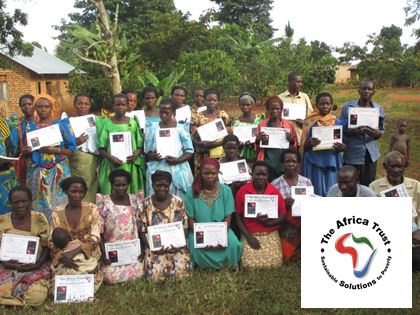
by Fern Shaw | Mar 30, 2017 | Charity
AquAid donations to the
Africa Trust in 2015 increased from £807,457 to a phenomenal £847,309 in 2016. This meant that last year an additional £39,852 was donated to the Africa Trust.

In Kenya, Tanzania and Malawi, this involves training and small loans for some of the poorest people in Africa.Aside from 607 Elephant Pumps built last year, providing water to 203,100 more people, this funding has helped thousands of people to start small businesses, which has lifted them and their families out of poverty.
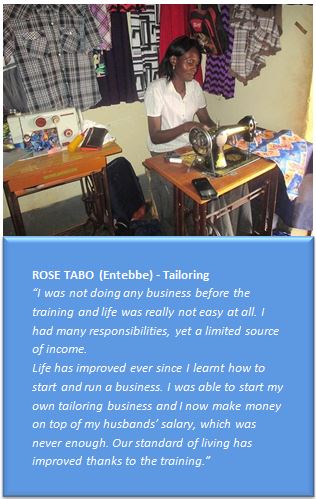 In Zimbabwe, cooperative dairy businesses have been established along with a banana production project, which is currently helping around 2,000 orphans and vulnerable children to pay their fees and stay in school.
In Zimbabwe, cooperative dairy businesses have been established along with a banana production project, which is currently helping around 2,000 orphans and vulnerable children to pay their fees and stay in school.
In Uganda, the business skills training programme, which AquAid funds, continues to thrive. 2,063 people were trained last year resulting in 618 new businesses being started. 825 businesses reported that they were able to improve their performance after training. 639 new jobs have been created.
These continued successes from both Christian Aid and the Africa Trust, which are making a significant difference in other’s lives, are made possible thanks both to our customers and the hard work from everyone at AquAid.
If you’d like to find out more about becoming an AquAid customer, please do get in contact.
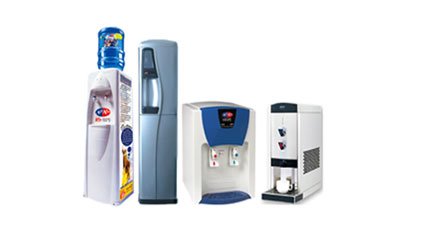
by Fern Shaw | Oct 11, 2016 | mains fed water cooler, Water, water cooler, Water Coolers
AquAid has been in the business of providing water coolers for near on two decades. This means we have a wealth of experience in fulfilling your water and water cooler requirements, ranging from:
AquAid provide water coolers and services to more than 30 000 customers throughout England, Ireland and Scotland.
We continue to ensure the provision of the correct water cooler solutions to our customers, coupled with services that include;
Fortnightly delivery plus our exclusive emergency next day delivery, free of charge;
Ongoing water cooler maintenance by AquAid trained and experienced engineers;
Keeping your AquAid local and in doing so, keeping it ‘green’.
There are 29 AquAid depots across the length and breadth of the UK. This means a smaller carbon footprint in the delivery of our water coolers, bottled water deliveries and your water cooler maintenance.
If you’d like more information on AquAid Water Coolers, our range of products and services that we offer, please either contact us here or telephone us on 0800 772 3003 – we be delighted to assist you.
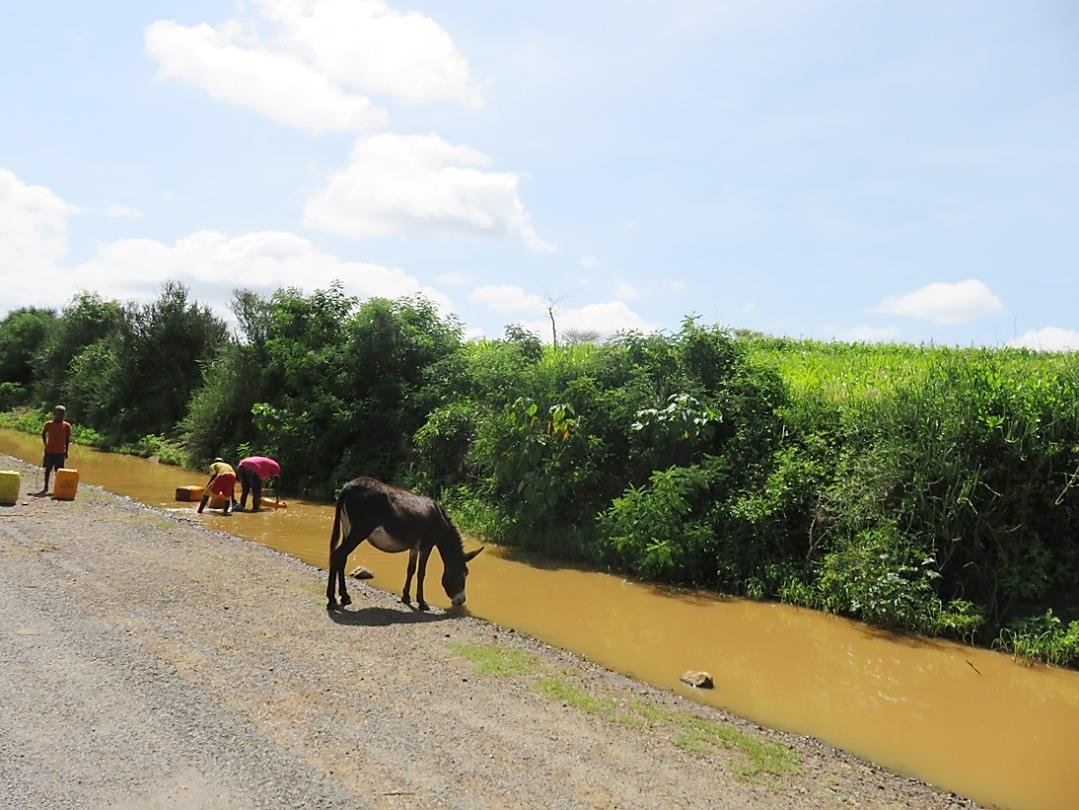
by Fern Shaw | May 31, 2016 | Charity, Christian Aid, water cooler, Water Coolers
It’s not often that I can say that I’m truly overwhelmed. I may drama queen a little about being overwhelmed but that’s not often the case.
What I did find truly overwhelming was my recent nine day visit to Ethiopia at the behest of AquAid and at the invitation of a charity which AquAid have for years supported; Christian Aid.
Having worked in water provision and in close conjunction with the charities that AquAid support for a few years now, this is a matter that has taken on a great significance to me, as well as, I’m sure, everyone at AquAid. I’ve experienced daily how important it is to balance the business side as well as maintaining and perpetuating Paul Searle’s (AquAid’s founder) holistic philosophy of giving back. On the trip, though, I experienced this philosophy first hand.
Ethiopia is a magnificent country, that’s the only way that I can describe it. The Ethiopians are among the kindest, most hospitable and polite people I’ve met in my travels; the country is vast, the scenery is awe inspiring and the industriousness of the people is truly something to witness.
After a briefing at the Christian Aid offices in Addis Ababa, we departed on the first leg of our journey to visit the first of four projects in the south of the country. As our amazing driver, Girma, who would put any F1 driver to shame, negotiated his way through an endless progression of pedestrians, other road users which also included herds of cattle; sheep and goats as well as donkey, mule and horse carts, I observed something interesting. Every mile or so there were people walking. Not a gentle lollygagging type of walk, but walking with determination. Most were carrying yellow containers. Many of these people were very young children, some who looked to be no older than seven or eight years old.
When we passed a puddle on the side of the road, a river, a stream, there were people collecting water. I have no idea how many miles these people walked every day, but I imagine it was a good few miles at least. They shared the puddles with all manner of others including animals. These puddles were open to the elements, unprotected and quite a few puddles alongside certain stretches of road had all the detritus from the road and its passing traffic landing in them.
- The magnitude of what I was witnessing struck me – here is a country that has water in abundance (Ethiopia has more vast lakes than you can shake a stick at), but a large majority of its inhabitants live and work hundreds of miles away from these large sources of water. They are dependent on the weather – their water source more often than not from the rainfall; and the country experiences dry months for eight out of the twelve months of the year.
- This is where charities such as Christian Aid come in and have been doing so in the country since 1998 when they set up an office in Addis Ababa. Christian Aid and AquAid have been working in partnership since 2001, bringing relief and sustainable water provision to those in need around the globe.
We witnessed five such projects during our trip which I will detail in further articles, but having being there, the importance of having water or indeed, having access to water, truly struck home. Here were thousands of people to whom the struggle for water, stuff of life, wasn’t a turn of a tap or a press of a button away. Here, having water meant a day to day survival, where if you wanted water, you strapped plastic containers to yourself and you started walking, for miles and miles, looking for the precious stuff. You may get ‘lucky’ and find a big enough water puddle from which you could fill your containers, often you would not.
What also occurred to me (during and post trip) is how invaluable it is to have companies such as AquAid and even more invaluable – our customers who support AquAid. Because I truly witnessed the results of what charity means. For every person from each community that we visited who had water to drink, water to cook with, water to water their livestock and their crops, this was a direct result of donations to charity. Life changing stuff.
If you’d like to find out more about how your water cooler and bottled water purchases can make a difference to people’s lives (and I mean this literally), please get in contact. We’d love to hear from you.
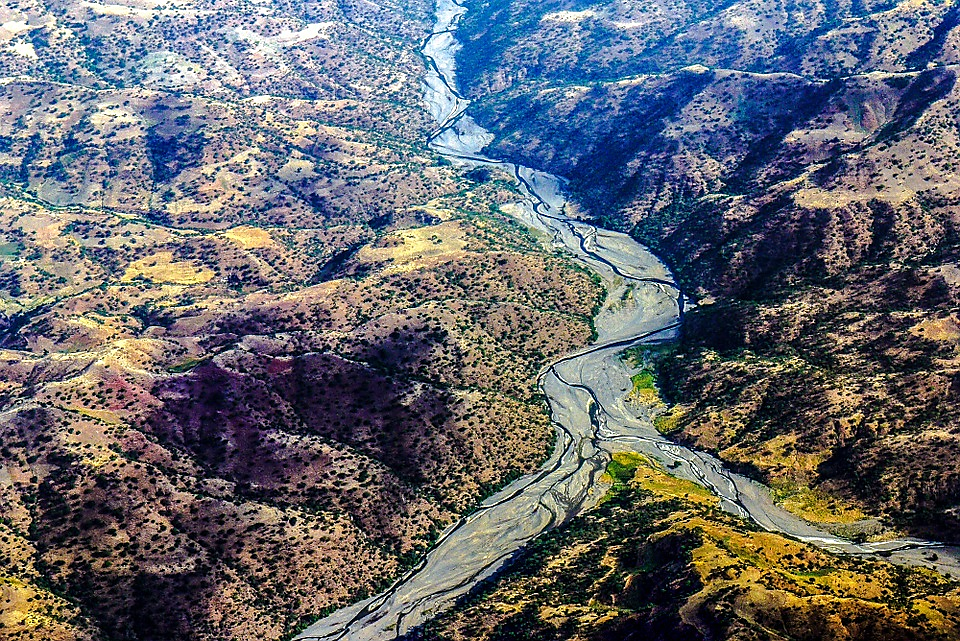
by Fern Shaw | May 4, 2016 | Charity, Christian Aid
Ethiopia is without a doubt one of the most fascinating countries on the African continent. It has an incredibly ancient and cultural history and is believed to be (by some) to be a cradle of civilisation and the birthplace of Christianity.
Addis Ababa is Ethiopia’s capital city. It means ‘white flower’ and, at 2 400 m above sea level, it is the 4th highest capital city in the world.
The Great Rift Valley cuts through Ethiopia from northeast to south of the country and is the only physical feature of Africa that it visible from space.
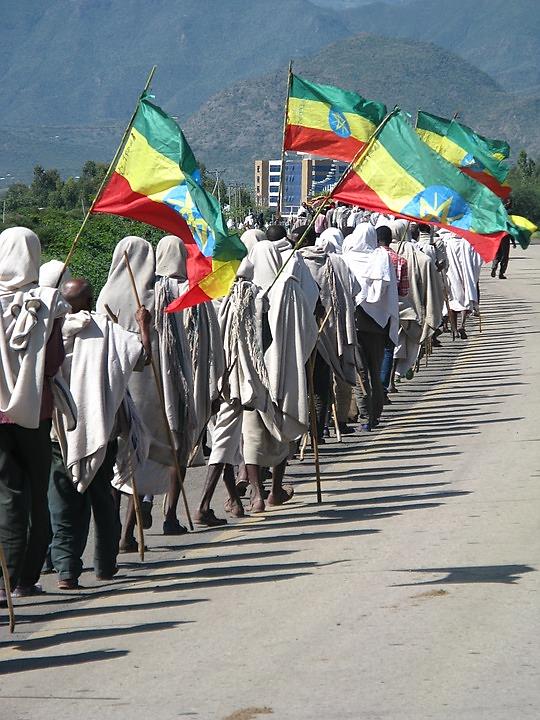 According to legend, the True Cross on which Jesus Christ was crucified was found by St. Helena – the mother of Constantine the Great, the Roman Emperor who converted to Christianity – in the 4th century. A relic of that cross was later given to Ethiopia’s kings for protecting Coptic Christians in their country. Meskel celebrates the arrival of the True Cross in Ethiopia and has been celebrated there for more than 1,600 years.
According to legend, the True Cross on which Jesus Christ was crucified was found by St. Helena – the mother of Constantine the Great, the Roman Emperor who converted to Christianity – in the 4th century. A relic of that cross was later given to Ethiopia’s kings for protecting Coptic Christians in their country. Meskel celebrates the arrival of the True Cross in Ethiopia and has been celebrated there for more than 1,600 years.
Ethiopia is considered the originator of honey wine, or t’ej, which the rest of the world knows as mead.
More than 70% of Africa’s mountains are found in Ethiopia. It is sometimes called ‘the roof of Africa.’
Ethiopia was the first African nation to join the League of Nations.
The Garima Gospels, the oldest illustrated Christian book, is in Ethiopia. It was written about A.D. 494 by the Abba Garima, a monk who arrived in Ethiopia from Constantinople (present-day Istanbul). According to legend, he wrote the book in one day.
Ethiopia is home to the Black Jews, known as the Falashas or Beta Israel (House of Israel). Various legends claim they are a lost tribe of Israel or descendants of King Solomon.
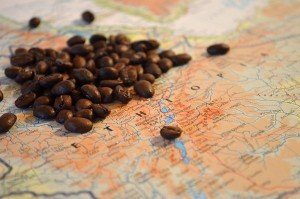 Coffee was first discovered by an Ethiopian goat herder named Kaldi in the Kaffa region, from which the word ‘coffee’ may derive, when he noticed his goats ‘dancing’ after eating the berries off the coffee plant. Coffee is the top agricultural export for 12 countries, with the livelihood of over 100 million people depending on its production, and it is the world’s second most valuable commodity after petroleum.
Coffee was first discovered by an Ethiopian goat herder named Kaldi in the Kaffa region, from which the word ‘coffee’ may derive, when he noticed his goats ‘dancing’ after eating the berries off the coffee plant. Coffee is the top agricultural export for 12 countries, with the livelihood of over 100 million people depending on its production, and it is the world’s second most valuable commodity after petroleum.
Emperors ruled Ethiopia until 1974 and all claim to be descendants of King Solomon of the Bible and Makeda (Ethiopian Queen of Sheba). Haile Selassie I was the last Ethiopian emperor.
Ethiopian emperor Haile Selassie I is considered the son of God among the followers of the Jamaican Rastafaria religion. In fact, the name ‘Rastafari’ originates from the emperor’s birthplace, Ras Tafari, which means ‘Prince Tafari’ in Amharic. Bob Marley was one well-known Rastafari. Although the Rastafari movement did evolve in Jamaica, it began in Ethiopia.
The Abyssinian cat breed, which originated in Ethiopia, ranks within the top ten most popular pedigreed cat breed in the U.K.
Lucy, a human fossil believed to have existed over 3 million years ago, was found in the Great Rift Valley in Ethiopia in 1974. She was named after the Beatles’ song “Lucy in the Sky with Diamonds”, which was playing on the radio at the time she was found. Even older remains were found in Hadar in 2001. Dated at more than 5 million years old, they are the earliest known ancestors of modern humans.
Christian Aid is an organisation that provides urgent, practical and effective assistance where need is great, tackling the effects of poverty as well as its root causes. The organisation has been providing assistance and relief in Ethiopia for decades and AquAid continue to be one of Christian Aid’s main corporate sponsors, especially with a view to water provision projects in Ethiopia and other countries in need.


 Malawi is among the world’s most densely populated and least developed countries. Around 55 per cent of people live on less than US$1 a day. Ninety percent of the Malawi population in rural areas are smallholder farmers.
Malawi is among the world’s most densely populated and least developed countries. Around 55 per cent of people live on less than US$1 a day. Ninety percent of the Malawi population in rural areas are smallholder farmers.


 In Zimbabwe, cooperative dairy businesses have been established along with a banana production project, which is currently helping around 2,000 orphans and vulnerable children to pay their fees and stay in school.
In Zimbabwe, cooperative dairy businesses have been established along with a banana production project, which is currently helping around 2,000 orphans and vulnerable children to pay their fees and stay in school.


 According to legend, the True Cross on which Jesus Christ was crucified was found by St. Helena – the mother of Constantine the Great, the Roman Emperor who converted to Christianity – in the 4th century. A relic of that cross was later given to Ethiopia’s kings for protecting Coptic Christians in their country. Meskel celebrates the arrival of the True Cross in Ethiopia and has been celebrated there for more than 1,600 years.
According to legend, the True Cross on which Jesus Christ was crucified was found by St. Helena – the mother of Constantine the Great, the Roman Emperor who converted to Christianity – in the 4th century. A relic of that cross was later given to Ethiopia’s kings for protecting Coptic Christians in their country. Meskel celebrates the arrival of the True Cross in Ethiopia and has been celebrated there for more than 1,600 years. Coffee
Coffee